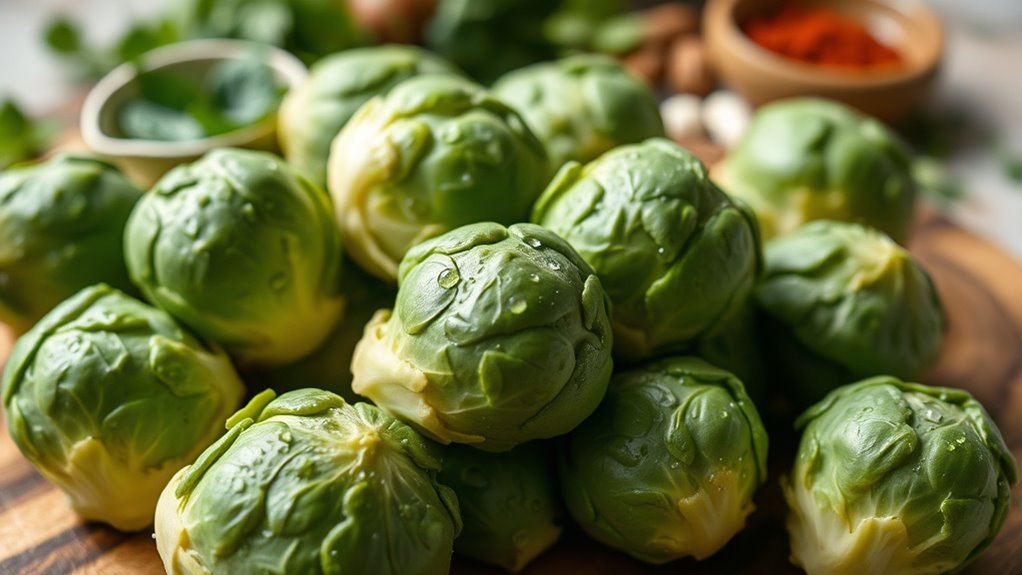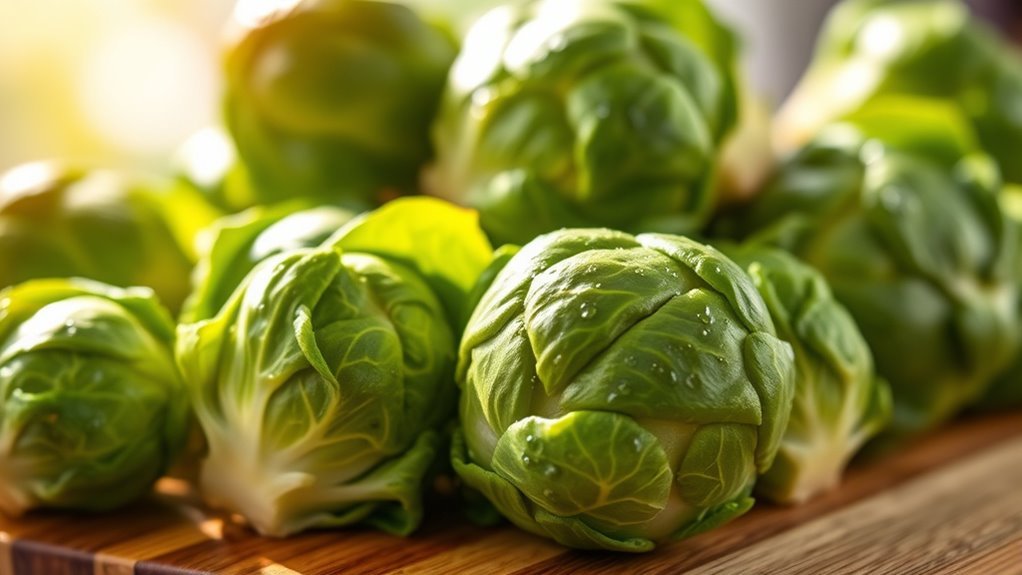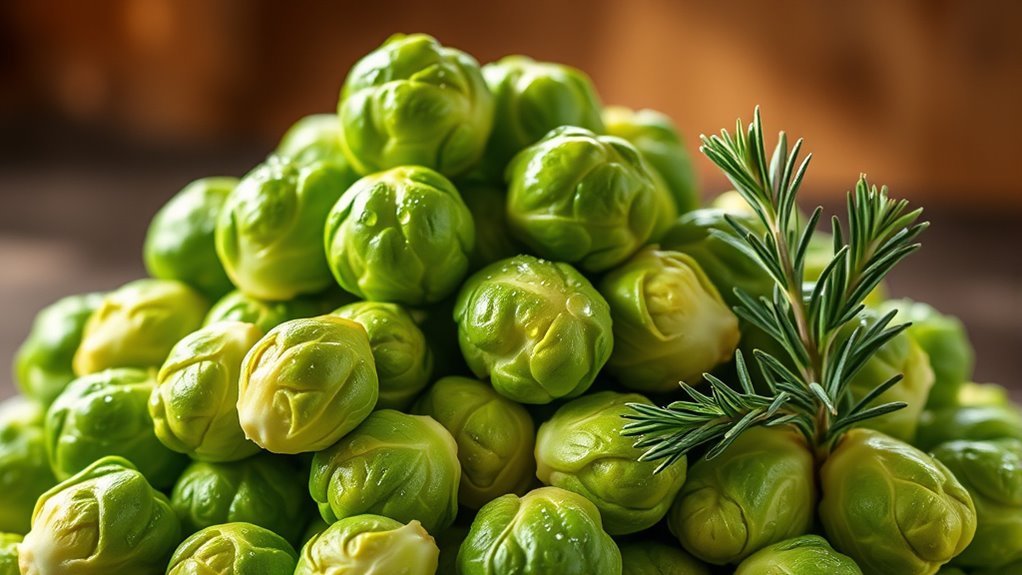Yes, Brussel sprouts are keto-friendly! With about 4 grams of net carbs per 100 grams, they fit perfectly into a low-carb diet. Not only are they low in calories, but they’re also packed with fiber, vitamins C and K, and antioxidants that support overall health. Plus, their versatility means you can prepare them in various tasty ways. If you’re curious about how to prepare them and their health benefits, there’s more to explore!
Nutritional Profile of Brussel Sprouts

When you consider incorporating Brussels sprouts into your keto diet, you’ll find that their nutritional profile is quite impressive. These cruciferous vegetables are low in calories yet rich in vitamins C and K, fiber, and antioxidants, making them a healthy choice. You can enjoy them using various cooking methods—roasting, steaming, or sautéing—each enhancing their unique flavor. For serving suggestions, pair them with olive oil and garlic for a savory side dish or toss them into salads for added crunch. Their versatility allows you to experiment while staying compliant with your dietary goals. By choosing Brussels sprouts, you’re not just adding variety; you’re also fueling your body with essential nutrients that support your freedom to thrive on a keto lifestyle.
Carb Content and Ketogenic Compatibility

Although many vegetables contain higher carbohydrate counts, Brussels sprouts stand out as an excellent option for those following a ketogenic diet. These mini-cabbages pack a nutritional punch with only about 4 grams of net carbs per 100 grams. This low carb content makes them compatible with the macronutrient restrictions of a ketogenic diet, allowing you to enjoy them without derailing your goals. Additionally, their fiber content aids digestion, contributing to overall gut health—a vital aspect of maintaining ketosis. Incorporating Brussels sprouts into your meals not only aligns with your carb limits but also diversifies your vegetable intake. So, if you’re looking for a delicious, keto-friendly vegetable, Brussels sprouts are definitely worth adding to your plate.
Health Benefits of Brussel Sprouts

Brussel sprouts are packed with essential nutrients that can greatly boost your health. They’re rich in vitamins C and K, as well as fiber, making them a powerful addition to your diet. Additionally, their antioxidant properties help combat oxidative stress, supporting overall wellness.
Nutrient Density Overview
Eating nutrient-dense foods is essential for anyone looking to improve their health, and Brussels sprouts stand out as an excellent choice. These little green gems are packed with vitamins, minerals, and fiber, making them a powerhouse of nutrition. With high levels of vitamin C, vitamin K, and folate, they offer substantial health benefits without adding excessive calories. The nutrient density of Brussels sprouts means you’re getting more nutrients per calorie, which can greatly enhance your overall health impact. Incorporating them into your diet can support immune function, promote healthy digestion, and even aid in weight management. By choosing Brussels sprouts, you’re making a conscious decision to nourish your body with foods that truly matter.
Antioxidant Properties Explained
The nutrient density of Brussels sprouts is complemented by their impressive antioxidant properties, which play a significant role in promoting overall health. Packed with vitamins C and K, these cruciferous vegetables offer a rich source of antioxidants that combat oxidative stress. This can lead to potential anti-inflammatory benefits, helping to reduce the risk of chronic diseases. The high vitamin content also supports your immune system and enhances skin health. When you include Brussels sprouts in your diet, you’re not just enjoying a low-carb side dish; you’re also harnessing the power of antioxidants to boost your well-being. So, embracing Brussels sprouts can be a delicious way to elevate your health while staying aligned with your keto lifestyle.
Fiber Content and Digestive Health
While many people may overlook vegetables when following a keto diet, incorporating fiber-rich options like Brussels sprouts can greatly benefit your digestive health. These small veggies are packed with fiber, which is essential for maintaining gut health and promoting digestive balance. A serving of Brussels sprouts provides about 4 grams of fiber, helping to regulate bowel movements and prevent constipation. This fiber also feeds beneficial gut bacteria, which can enhance your overall well-being. By including Brussels sprouts in your meals, you’re not just enjoying a delicious side dish; you’re actively supporting a healthy digestive system. So, don’t shy away from these little green powerhouses—they’re an excellent way to keep your gut happy while staying true to your keto lifestyle.
How to Prepare Brussel Sprouts for Keto
To make the most of your Brussels sprouts on a keto diet, roasting them can enhance their natural sweetness and flavor. You can also sauté them in healthy fats like olive oil or butter for added richness. Finally, don’t forget to experiment with keto-friendly seasonings to elevate your dish even further.
Roasting for Maximum Flavor
Roasting Brussels sprouts not only enhances their natural sweetness but also brings out a depth of flavor that’s perfect for a keto diet. To achieve ideal flavor enhancement, preheat your oven to 400°F (200°C). Trim and halve the sprouts, then toss them with olive oil, salt, and pepper. This simple roasting technique allows the outer leaves to crisp up while the insides become tender. Roast for about 25-30 minutes, shaking the pan halfway through for even cooking. Consider adding spices like garlic powder or paprika for an extra kick. The caramelization that occurs during roasting intensifies their taste, making them a satisfying addition to your keto meals. Enjoy the freedom of flavor with this easy preparation!
Sautéing With Healthy Fats
Sautéing Brussels sprouts in healthy fats like olive oil or grass-fed butter can elevate their flavor and nutritional profile, making them an excellent choice for a keto diet. To maximize your sautéing techniques, follow these steps:
- Choose the Right Healthy Oils: Opt for oils high in monounsaturated fats, such as olive oil, or use grass-fed butter for added nutrients.
- Heat Properly: Preheat your pan to medium heat before adding the oil. This guarantees even cooking and enhances the sprouts’ natural sweetness.
- Don’t Overcrowd the Pan: Give your Brussels sprouts space to cook evenly. If you overcrowd, they’ll steam instead of sauté, losing that desired crispness.
Adding Keto-Friendly Seasonings
While you might think Brussels sprouts need elaborate seasonings, enhancing their flavor for a keto diet can be both simple and effective. Start by experimenting with spice combinations like garlic powder, paprika, and black pepper. These spices not only complement the natural earthiness of Brussels sprouts but also keep carb counts low. For a richer flavor, consider savory toppings like grated Parmesan cheese or crumbled bacon, which align perfectly with keto principles. You can also drizzle olive oil or melted butter over your sprouts before roasting to amplify taste without adding carbs. By using these keto-friendly seasonings, you’ll elevate your Brussels sprouts while staying true to your dietary preferences and enjoying every bite.
Delicious Low-Carb Brussel Sprout Recipes
If you’re looking to incorporate more low-carb vegetables into your keto diet, Brussel sprouts are a fantastic choice. These nutrient-dense veggies fit perfectly into gourmet preparations and savory dishes. Here are three delicious low-carb Brussel sprout recipes to try:
- Roasted Brussel Sprouts with Bacon: Toss halved sprouts with olive oil, salt, and crispy bacon. Roast until caramelized for a savory treat.
- Brussel Sprout Salad: Shred raw sprouts and mix with avocado, nuts, and a tangy lemon vinaigrette for a revitalizing dish.
- Sautéed Brussel Sprouts with Garlic: Quickly sauté sprouts in olive oil with minced garlic for an aromatic side.
These low-carb recipes are not only easy to prep but also elevate your meals while keeping your keto goals on track. Enjoy!
Comparing Brussel Sprouts to Other Vegetables
When comparing Brussel sprouts to other vegetables, it’s clear they stand out not only for their flavor but also for their nutritional profile. Nutritionally, Brussel sprouts offer more fiber and vitamins C and K than cauliflower, making them a healthier choice for many. With regard to flavor profiles, Brussel sprouts deliver a nutty, slightly bitter taste that contrasts with cauliflower’s mild, slightly sweet flavor. Both vegetables can be prepared using various cooking methods, such as roasting, steaming, or sautéing, but Brussel sprouts caramelize beautifully when roasted, enhancing their natural sweetness. This combination of nutrition and taste makes Brussel sprouts a compelling option, especially for those on a keto diet seeking flavorful, low-carb veggies.
Tips for Buying and Storing Brussel Sprouts
When you’re shopping for Brussels sprouts, it’s essential to choose the freshest ones available. Look for firm, vibrant green sprouts that are tightly packed and avoid any that are yellowing or have blemishes. Once you’ve got them home, proper storage techniques, including refrigeration and freezing, can help maintain their quality and extend their shelf life.
Choosing Fresh Sprouts
Selecting fresh Brussels sprouts is essential for maximizing their flavor and nutritional benefits. When you’re on the hunt, consider these tips for ideal fresh sprout selection:
- Look for Firmness: Choose sprouts that are compact and firm, avoiding any that feel soft or mushy.
- Check Color: Fresh sprouts should have a vibrant green hue. Yellowing or browning leaves indicate aging.
- Seasonal Availability: Brussels sprouts are typically in season from late fall to early spring, so buy them during this time for the best quality.
Proper Storage Techniques
Although storing Brussels sprouts properly may seem straightforward, it can greatly impact their freshness and flavor. To guarantee peak Brussel sprouts storage, keep them in a breathable bag or container, ideally in the crisper drawer of your fridge. The ideal temperature for storage is between 32°F and 40°F (0°C to 4°C). This environment helps maintain their crispness and prevents spoilage. Avoid washing them before storage, as moisture promotes decay. Instead, wash only before use. If you notice any yellow or wilted leaves, remove them to prolong the shelf life of the remaining sprouts. By following these simple guidelines, you’ll enjoy fresh, flavorful Brussels sprouts in your meals, enhancing both taste and nutrition.
Freezing for Longevity
Freezing Brussels sprouts can extend their shelf life considerably, allowing you to enjoy their nutritional benefits long after the harvest season. To guarantee they maintain their quality, follow these steps:
- Blanching Technique: Briefly boil the sprouts for 3-5 minutes, then plunge them into ice water. This preserves color and nutrients.
- Drying: After blanching, make sure to dry them thoroughly to prevent ice crystals from forming.
- Vacuum Sealing: Use a vacuum sealer to package the sprouts. This minimizes air exposure, preventing freezer burn.
Potential Drawbacks of Eating Brussel Sprouts on Keto
While many people embrace Brussel sprouts as a nutritious option on the keto diet, there are potential drawbacks to reflect upon. You might experience digestive issues, including gas production, especially if you consume them raw or improperly cooked. Their oxalate content can interfere with nutrient absorption and may affect blood sugar levels in sensitive individuals. Allergic reactions, though rare, can occur in some, leading to discomfort. It’s crucial to evaluate your individual tolerance, as not everyone reacts the same way to these cruciferous vegetables. Opting for specific cooking methods, like steaming or roasting, may help mitigate these issues. Ultimately, being aware of these potential drawbacks will empower you to make informed choices about including Brussel sprouts in your keto lifestyle.
Conclusion: Brussel Sprouts in Your Keto Diet
When considering Brussel sprouts as part of your keto diet, it’s important to recognize their nutritional benefits alongside potential drawbacks. These cruciferous veggies can be a great addition, provided you choose the right Brussel sprout varieties and cooking methods. Here are three key points to keep in mind:
- Low in Carbs: Brussel sprouts are low in carbohydrates, making them a suitable choice for keto.
- High in Fiber: They offer a good amount of fiber, which can help with digestion and satiety.
- Versatile Cooking: You can enjoy them roasted, sautéed, or steamed, allowing for diverse meal options.
Incorporating Brussel sprouts thoughtfully can enhance your keto experience while still enjoying flavorful meals.
1. Are Brussels sprouts keto-friendly?
Yes, Brussels sprouts are considered keto-friendly. They are low in carbohydrates, making them an excellent choice for those following a ketogenic diet. A 1-cup serving of cooked Brussels sprouts contains approximately 8 grams of total carbohydrates, 4 grams of which are fiber, resulting in only about 4 grams of net carbs. This low net carb content allows them to fit well within the daily carbohydrate limits of a standard keto diet.
2. How many carbs are in Brussels sprouts?
One cup of cooked Brussels sprouts (approximately 156 grams) contains about 8 grams of total carbohydrates. Out of these, 4 grams are dietary fiber, which is not digested and does not count towards net carbs. Therefore, the net carb count is around 4 grams per cup, making Brussels sprouts a suitable vegetable choice for those on a ketogenic diet.
3. What are the health benefits of Brussels sprouts on a keto diet?
Brussels sprouts offer numerous health benefits, especially when included in a ketogenic diet. They are rich in vitamins C and K, providing antioxidant properties that help reduce inflammation and support immune function. Additionally, their high fiber content promotes digestive health and can help maintain a feeling of fullness, aiding in weight management. The low carb count makes them an ideal vegetable choice, allowing for nutrient diversity without exceeding carb limits.
4. How can I prepare Brussels sprouts for a keto diet?
Brussels sprouts can be prepared in various delicious ways to fit a keto diet. Popular methods include roasting, sautéing, or steaming. Roasting Brussels sprouts with olive oil, garlic, and herbs enhances their natural sweetness and adds flavor. You can also slice them thinly and sauté them with butter and bacon for a rich, savory side dish. Experimenting with spices and cheeses can also create tasty variations while keeping them low in carbs.
5. Are there any reasons to avoid Brussels sprouts on a keto diet?
While Brussels sprouts are generally beneficial for a keto diet, some individuals may experience digestive discomfort due to their high fiber and carbohydrate content. They contain compounds called goitrogens, which can interfere with thyroid function in sensitive individuals. For most people, however, Brussels sprouts are a nutritious option. If you have specific dietary restrictions or health conditions, it’s always best to consult with a healthcare provider or nutritionist before making significant changes to your diet.
References
- https://www.healthline.com/nutrition/brussels-sprouts-keto
- https://www.ncbi.nlm.nih.gov/pmc/articles/PMC6470971/
- https://www.verywellfit.com/are-brussels-sprouts-keto-friendly-5183347
- https://www.wholefoodsmarket.com/recipes/brussels-sprouts-keto
- https://www.livestrong.com/article/541659-are-brussels-sprouts-keto-friendly/
- https://www.eatright.org/health/wellness/healthy-eating/are-brussels-sprouts-keto-friendly
- https://www.sciencedirect.com/science/article/pii/S2211912418301517


